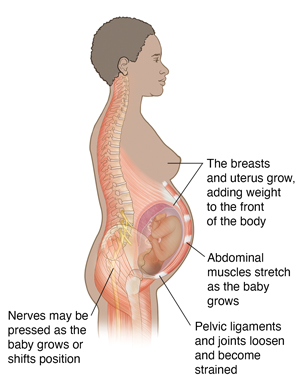As your body changes during pregnancy, your back must work in new ways. This can be painful if your back isn’t prepared. Back pain is due to many causes. Physical changes to your body can strain your back and its supporting muscles. Also, levels of certain hormones (chemicals that carry messages throughout the body) increase during pregnancy. This can affect how the muscles and joints work together. All of these changes can lead to pain.
Your back
The spine is the column of bones that runs down your back. It has 3 curves: the cervical, thoracic, and lumbar. These curves support your body and help you keep your balance. Muscles in your back and belly (abdomen) brace and support the spine. Muscles in your buttocks, pelvis, and thighs work with your spine to let you twist, bend, and lift.
Relieving back symptoms
If your back pain is severe or lasts longer than 2 weeks, contact your healthcare provider. In the meantime, try these tips to help prevent or reduce your back pain:
-
When picking something up, don't bend over at the waist. Instead bend at the knees and keep your back straight.
-
Don't lift anything heavy.
-
Don't keep standing for a long time. If you are standing for a while, try resting one foot on a box or stool.
-
Wear low-heeled shoes. Look for shoes that have good arch support. Don't wear high heels or flats.
-
Watch your posture. Stand up straight. Keep your chest up and your shoulders back. When sitting, put a small pillow behind your lower back for added support.
-
Rest as much as you can. Keeping your feet raised (elevated) can help.
-
Don't sleep on your back.
-
Use a heating pad or ice pack as needed.
Your back during pregnancy
During pregnancy, changes in your body affect your back and how you position your body (your posture). Your body’s shape and size change, making your muscles work harder. As the body prepares for childbirth, hormones cause pelvic muscles, ligaments, and joints to loosen. This can lead to pain. These changes may also cause you to use positions that strain the spine (poor posture). Over time, poor posture often results in back pain. Talk with your healthcare provider about whether a maternity support belt might help ease some of the pressure and pain in your lower back.


